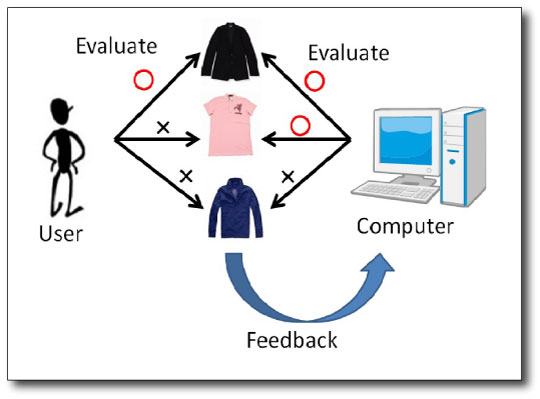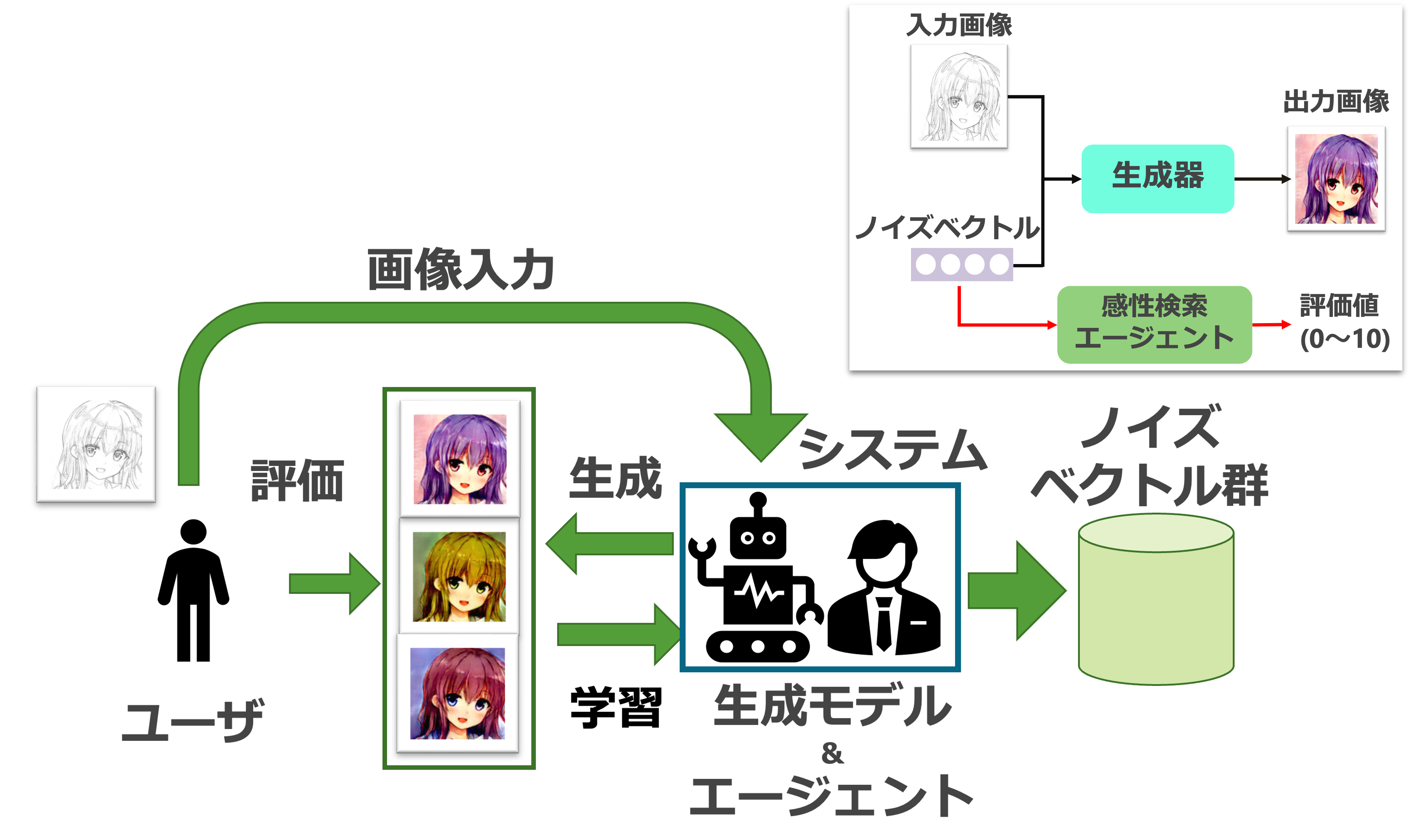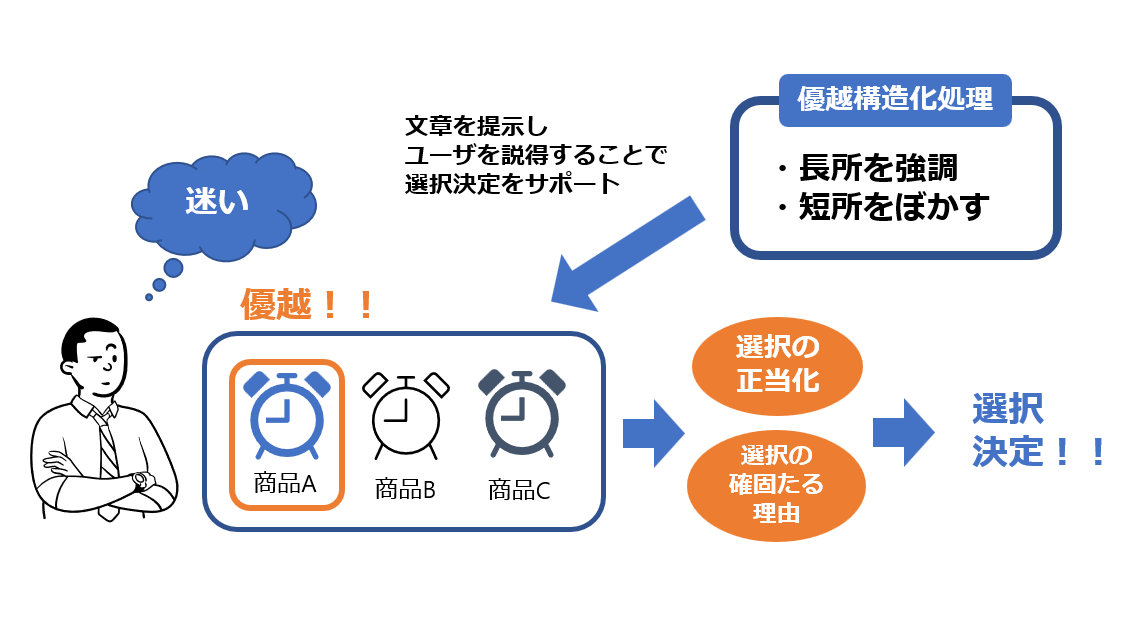
Kansei Retrieval Systems
User's preference-aware kansei search!
Today, if you want information, you can easily obtain it by searching keywords on the internet. However, the amount of information that appears is enormous, making it difficult to find the information you truly want. For example, when trying to buy fashion goods online, the number of search results is so large that checking each product one by one to find items matching your preferences is a very time-consuming task. Our laboratory is working on developing a kansei search system that accurately retrieves desired information by considering the user’s preferences to solve this problem.
Realization of a Kansei Search System
Even with kansei search, it is not possible to accurately retrieve the desired information by understanding the user's sensibility from the start. To perform kansei search, the computer needs to learn the user's sensibility. So, how does the computer understand a person’s sensibility? Let's consider an example of learning a user's clothing preferences.

First, both the user and the computer evaluate a piece of clothing. At this time, the computer bases its evaluation on factors believed to influence a person’s impression of the clothing, such as color, pattern, and shape. Then, the computer learns the user’s preferences by comparing the differences between its own evaluation and the user’s evaluation. By repeating these steps, the computer can understand the user’s sensibility and also identify the clothing factors that influence the user’s evaluations.
Because human sensibility is extremely complex, fully understanding it remains a challenge. In this research, we aim to develop better methods for learning human sensibility and to create a kansei search system that is more convenient and innovative than traditional keyword-based search systems.
Related Work
Combining Kansei Retrieval and GAN to Foster Personalized Illustration Generation

This research focuses on the practical application of generative AI, which has seen remarkable advances in recent years. Traditionally, creating illustrations from scratch is a highly labor-intensive task. Therefore, we propose an illustration generation system that combines a kansei search agent with generative AI. This system can learn the user’s preferences and generate high-quality illustrations. Furthermore, by utilizing ControlNet, an extension feature of the Stable Diffusion generative model used in our system, it enables illustration generation based on user-drawn line art images. The combination of these technologies is expected to allow controlled generation that matches the user’s preferences while producing high-quality illustrations in a short time.
Product Recommendation System That Promotes Selection Using Dominance Structuring Process

This research proposes a recommendation system designed to facilitate user decision-making. In recent years, the use of recommendation systems on online shopping sites has increased significantly. However, conventional recommendation systems often suggest similar products, which can complicate users’ decision-making and potentially reduce post-purchase satisfaction. Our system calculates the importance of product attributes based on user preferences and computes evaluation scores for products. The proposed system consists of two stages: a "preference acquisition stage," where user preferences are inferred from selection information, and a "final decision-making stage," where the ultimate product choice is made. In the final decision-making stage, texts structured using a dominance structuring process are presented to users to encourage product selection. Experimental results confirmed that the proposed system effectively promotes decision-making through the dominance structuring process. This research is expected to reduce users’ hesitation during purchase and enable smoother final decisions. Additionally, by allowing users to confidently select products that match their preferences, it is anticipated to enhance post-purchase satisfaction.
References
Takaki Urai, Masataka Tokuamaru, “User Kansei Clothing Image Retrieval System”, Journal of Advanced Computational Intelligence and Intelligent Informatics, Vol.18, No.6 pp. 1044-1052, 2014-11.
*Yuka Nishimura, Hiroshi Takenouchi, Masataka Tokumaru, “Extracting Preference Rules Using Kansei Retrieval Agents with Fuzzy Inference”, International Journal of Affective Engineering, Vol.21, No.3, pp.181-190, 2022-0
Yuya Tsubokura, Emmanuel Ayedoun, Hiroshi Takenouchi, Masataka Tokumaru, “Combining Kansei Retrieval and GAN to Foster Personalized Illustration Generation”, The 24th International Symposium on Advanced Intelligent Systems, TM1-2, pp.6-11, 2023-12 (Gwangju, Korea).
Tetsuaki Togo, Emmanuel Ayedoun, Hiroshi Takenouchi, Masataka Tokumaru, “Product Recommendation System That Promotes Selection Using Dominance Structuring Process”, 10th International Conference on Kansei Engineering and Emotion Research 2022 (KEER2024), OAA-0035, pp.243-252, 2024-11 (Taichung, Taiwan).








